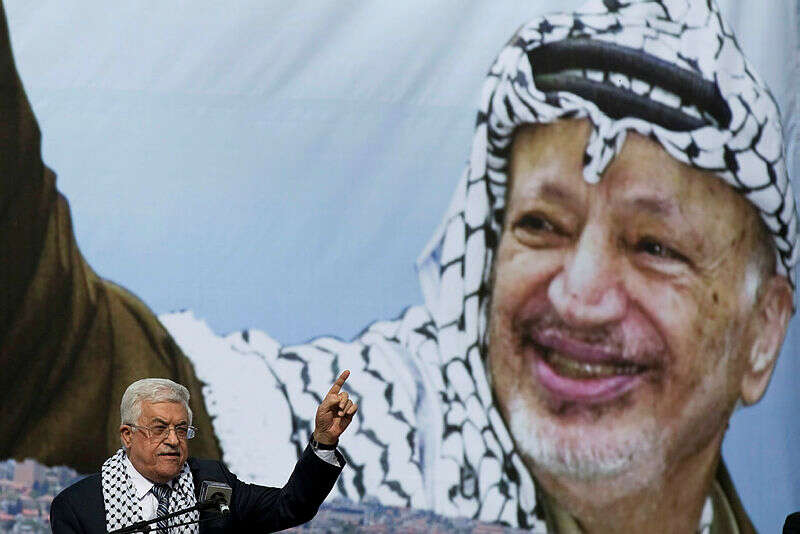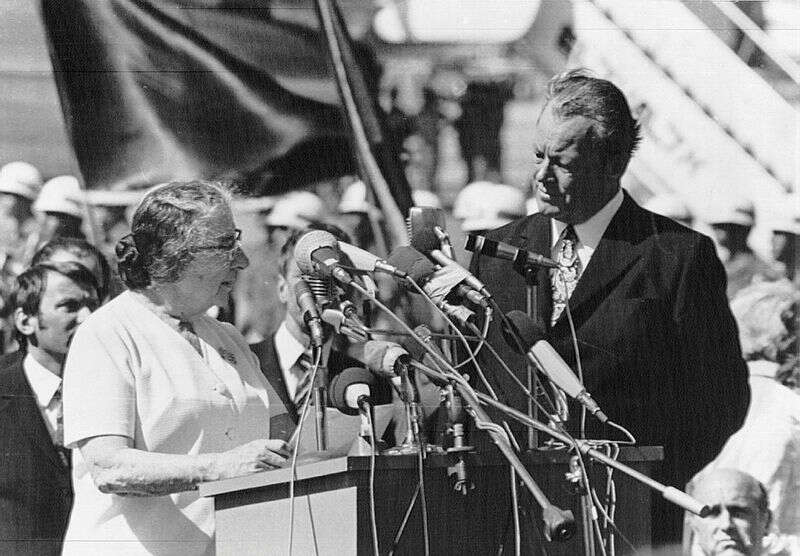New research based on thousands of documents from the German Foreign Ministry archives demonstrates that the West German government’s fear of Palestinian terrorist attacks, romantic Orientalism, and entrenched anti-Semitism led it to wave a white flag.
By Eldad Beck, ISRAEL HAYOM 06-17-2020 08:55

A member of the Palestinian terrorist group at the Munich Olympic Village | Photo: AP/Kurt Strumpf
On Tuesday, Feb. 10, 1970, an El Al flight took off from Israel, headed for London. The plane was carrying 52 passengers and 11 crew members. Passengers included actress Hannah Meron and actor Assi Dayan, the son of then-Defense Minister Moshe Dayan. Meron and Dayan were going to audition for “Fiddler on the Roof.”
At 12:30 the plane stopped in Munich for a connection, and 34 passengers got off. After a short wait in the terminal, the rest of the passengers got on a bus that would take them back to the aircraft. All of a sudden three Arab terrorists boarded the bus, armed with grenades and guns. They tried to hijack the vehicle. Captain Uri Cohen took down one of them, and the grenade the terrorist was holding exploded and blew off his hand. The German bus driver ignored the shouts not to allow the terrorist to board the bus. He opened the doors, and some of the passengers managed to get off, but then one of the terrorists threw a grenade inside the bus. Arie Katzenstein, 32, threw himself on the grenade – saving everyone else, but losing his own life. A total of 11 passengers were wounded, including Meron, who lost her left leg.
The three terrorists – two Jordanians and an Egyptian, all members of Dr. Issam Sartawi’s Action Organization for the Liberation of Palestine – were captured by West Germany’s security forces. They said they had planned to hijack the aircraft to Libya and demand that Israel release dozens of security prisoners in exchange for the hostages. The terrorists’ trial was repeatedly postponed, supposedly for bureaucratic reasons, but really because Germany was in no rush to hold a trial that posed a security risk. All three were released in September 1970 as part of a deal between West Germany and the Popular Front for the Liberation of Palestine that followed the hijacking of three passenger aircraft. Their release paved the way for the slaughter of Israeli athletes at the 1972 Munich Olympics.
A new study about the West German foreign ministry’s attitude toward Israel from 1967-1979 exposes how West Germany buckled to Palestinian terrorism and the key role West German diplomacy played in the country adopting a kid-gloves policy toward the Palestinians.
Author of the study Dr. Remko Leemhuis, acting director of the Ramer Institute for German-Jewish Relations at the American Jewish Committee in Berlin, says that “the Palestinians learned very quickly that in Germany, like other countries, terrorism paid off, and when they extorted the West German government, it would give in.”
“That conclusion clearly comes from conversations that representatives of the federal foreign ministry held with representatives of the Palestinians. Despite the Palestinians’ friendly conduct, they made it clear that if the people they were talking to didn’t do what the PLO wanted, the Palestinians couldn’t promise that there wouldn’t be more terrorist attacks on German soil. The German side was afraid of that.

“What is horrifying to me is that the German Foreign Ministry never held any discussion about finding a firm response to the Palestinian extortion. No one said, ‘We won’t let terrorists or Palestinians extort us.’ They threw up their hands and freed terrorists.
Leemhuis says Germany could have responded differently.
“I found a document from the American State Department that stated explicitly that the US could talk to the PLO, but for that to happen, it had to meet certain conditions, such as recognizing Israel’s right to exist,” he says.
When West Germany and Israel launched diplomatic relations in May 1965, most Arab countries severed ties with Bonn and approached East Germany, instead.
Leemhuis says that establishing relations with Israel was a “disaster” for West German foreign policy.
“Official talk about balanced relations with Israel and Arab states was a trick intended to hide the [German] foreign ministry’s true position, which was biased in favor of the Arabs,” he says.
“The Arabs controlled the most important resource for the world economy, oil, whereas the small Jewish state didn’t have much to offer. What’s more, Israel was a liberal democracy, and all the Arab states were dictatorships who were making daily threats to wipe it out. So even then, it wasn’t really possible to treat the two sides equally.”
Arab terrorism against Israel, via Palestinian organizations, increased after the Arab countries that fought Israel were trounced in the 1967 Six-Day War. The terrorist groups focused on attacks outside Israel’s borders, hoping to shake up its international position. The first such attack on West German soil was perpetrated in September 1969, when terrorists threw a grenade at the Israeli Embassy in Bonn. Luckily, no one was wounded.
Five months later, the El Al plane was attacked in Munich, heralding the start of Palestinian air terrorism in Europe. Only 11 days after the attempted hijacking in Munich, a bomb exploded in the cargo hold of an Austrian airplane that took off from Frankfurt and was headed to Tel Aviv, with a stopover in Vienna. The pilots managed to land in Frankfurt and avoid a major disaster. Terrorists also sent a bomb through the German postal system that was supposed to be sent on an El Al flight. But the package was placed on a Swissair plane and detonated in Swiss airspace, killing 74 passengers and crew.
Three days later, Germany’s ambassador to Jordan reported that one of his aides had met with Issam Sartawi. The ambassador wrote that he had approved the meeting so that Germany could “better assess the danger that Sartawi’s organization posed to German citizens in Jordan.”
Sartawi expressed regret at how the attempted hijacking in Munich had played out, but said that his organization had chosen West Germany because it was very “pro-Israeli” and stressed that the attack had been designed to force the West German public to re-think the Israeli-Palestinian conflict, and that he could not guarantee that his group would not decide to buck his instructions and carry out more attacks there.
The embassy aide promised to take steps to ensure that the German media did not report attacks by Sartawi’s organization “inappropriately” and did not spread suspicion of Arabs and Palestinians.
German diplomacy waved a white flag. Sartawi ended the meeting with a tempting offer, expressing his willingness to avoid more attacks on German soil and against German institutions if the three members of his group who were arrested in Munich were released.
A short while later, Israel’s foreign minister, Abba Eban, paid his first official visit to West Germany. He urged his hosts to hold Arab governments accountable for their support for the PLO and its terrorist activity. A few days passed, and Germany’s ambassador to Jordan met with King Hussein. According to a report he sent to the German Foreign Ministry, he did not devote a single word of the meeting to the fact that Jordan was hosting the terrorist organization that had attacked the El Al plane in Munich.
In July 1970, that same ambassador met with a senior official in the Fatah organization. Leemhuis is almost certain that the Fatah official was Ali Hassan Salameh, who would eventually become a leader of the Black September group, which murdered the Israeli athletes at the Munich Olympics.

The ambassador reported that he had told Salameh that Germany had stopped all weapons shipments to Israel and that the Germany government, particularly then-Chancellor Willy Brandt, were consistently working toward a neutral German position in the Middle East and that the government wanted to show the Palestinians that it desired good relations with them.
Palestinian terrorist attacks were not limited to Germany. In July 1970, terrorists from the Popular Front for the Liberation of Palestine hijacked an Olympic Airlines plane, demanding the release of seven terrorist imprisoned in Greece. Athens gave in. That September, the PFLP hijacked three more planes – TWA, Swissair, and Pan Am flights – to secure the release of terrorists. Two of the three hijacked planes were forced to land in Amman, as was a British plane that was hijacked later that month.
Terrorists were holding American, Israeli, German, and Swiss citizens hostage in Jordan. The separated the Jews from the rest of the passengers and demanded that terrorists imprisoned in Israel and in western Europe be released. The German government immediately signaled its willingness to meet their demands, and even pressured Israel to cooperate, sending a diplomat to meet in London with a representative of the World Jewish Congress, where he voiced concern that the deal did not include the Jewish and Israeli hostages.
Fearing a military mission to free the hostages, the terrorists moved them to various secret locations and blew up the aircraft. Attempts by the Red Cross to mediate failed, and the clock was ticking to a clash between the Jordanian army and the Black September group.
The German government decided to send the secretary-general of the ruling social-democratic party, Hans-Jurgen Wischnewski, a fervent supporter of the Algerian independence movement who had extensive connections in the Arab world, to Amman. Jerusalem saw him as pro-Arab. After a Red Cross delegation left Amman, Wischnewski met with Abu Maher Ghneim, one of the founders of the PFLP, who informed him that his group was willing to negotiate with each of the countries involved, separately.
Wischnewski urged Brandt to make an immediate announcement that Germany would be releasing the terrorists behind the Munich attack. Germany’s ambassador to Jordan also kept up the pressure.
On Sept. 30 the terrorists were let out of Germany.
From 1968-1984, 48 of the Palestinian terrorist attacks in Europe were carried out on German soil. The deadliest was the slaughter of the Israeli athletes at the Munich Olympics in 1972 by eight members of Black September.
The man responsible for the planning and execution of the attacks was the man Germany’s ambassador had met within Jordan, Ali Hassan Salameh.
Then-director of the Mossad, Zvi Zamir, who had been sent to Germany to track the attempts to rescue the athletes, asked his German counterpart what the German authorities intended to do with the terrorists who remained alive, since the Palestinians could hijack a Lufthansa plane and force the Germans to free them. The head of Germany’s spy agency said he couldn’t guarantee that scenario wouldn’t occur.
During the attack on the Olympic village, Brandt publicly criticized Arab nations, but his foreign minister, Walter Schell, rushed to clarify that the attack was “one instance” of terrorism for which the “governments of certain countries were not responsible.”

The day after the murder of the Israeli athletes, Germany’s ambassador to Egypt, Hans-Georg Stelzer, send a long letter to his superiors in which he recommended that Germany refrain from any harsh criticism of Arab countries, because they had no influence on acts of terrorism.
In a later message, Stelzer even asked that Germany show understanding of the terrorists: “Even if we must condemn the actions of the Munich terrorists, the Arab position must be understood … they see idealistic young people who were acting out of desperation at the crisis situation in their homeland.”
Leemhuis cites the “coldness and lack of empathy” with which the German authorities responded to the Munich Olympics massacre.
“They said, ‘Life goes on,’ without any feeling for the significance of the attack and its historical importance to the Israelis. The documents don’t show an ounce of any horror, or that any of the functionaries in the Foreign Ministry opposed the official approach and wanted to demand that the Palestinians be held responsible,” he says.

“They [the Foreign Ministry] knew that Black September was part of the PLO, and that in contrast to Yasser Arafat’s lies, the organization did not operate on its own. But none of that made any of the German diplomats pull away; it made them want to talk with the PLO, thinking that by doing so they could prevent terrorist attacks in Germany. That idea has guided all of [Germany’s] contact with the PLO,” Leemhuis observes.
Leemhuis discovered a document from October 1972, issued less than a month after the massacre, which clearly shows that the German Foreign Ministry knew about Black September’s ties to Fatah and that the new terrorist organization was designed to provide camouflage that would allow Fatah to avoid responsibility for terrorist acts committed by its members.
“The Fatah leadership wants to avoid any harm to the esteem in which it is held, to its good name, and to its stature,” the document reads.
The interior minister of Germany at the time, Hans-Dietrich Genscher, outlawed activity by Palestinian student activists and deported hundreds of illegal Arab residents, as well as ordering strict border checks for Arab citizens entering West Germany. But the Foreign Ministry opposed these steps and they were eventually canceled.
According to Leemhuis, “The Foreign Ministry wasn’t worried about relations with Israel at all, just with the Arab image in West German media. There was no sense of guilt about the negligent developments that led to the deaths of nine athletes in the failed rescue attempt [two others were killed in the Olympic village itself]. The prevailing belief was that Germany had done everything correctly, no mistakes. Even Israel’s response was relatively placating. Golda Meir was very careful in her criticism,” he notes. (Meir was very close to Brandt and did not want to endanger his chances of re-election in November of that year).

It took little time for Zamir’s prediction to be fulfilled. On Oct. 29, 1972, Palestinian terrorists indeed hijacked a Lufthansa flight that was en route to Frankfurt from Damascus, with planned stops in Beirut, Ankara, and Munich. The hijackers demanded that the three terrorists arrested after the murder of the Israeli athletes be freed. The West German government agreed that same day, and the three were flown to Libya. The terrorists let the hostages go.
Even today, some claim that the hijacking had been coordinated between the PLO and the German government as a way of allowing the Germans to avoid trying the terrorists in court. Leemhuis has found no confirmation of that theory, but says that in 2009, one of Brandt’s close advisors told a German paper that he saw the idea as “legitimate.”
The day the terrorists were released, the director of the Middle East Desk in the German Foreign Ministry sent a telegram to the Israeli government which read, “In regard to the accusations that our government has given in to the Palestinian guerrilla fighters and is thereby encouraging more actions of this type, it should be said that the federal government cannot make a decision that would put the lives of the passengers and crew of the hijacked plane in danger.”
The telegram ended with the observation: “These are the results of a conflict, and both sides have a responsibility to reach a solution.”
Israel was outraged that the terrorists had been freed. Eban summoned the German ambassador to Israel for a rebuke, telling him that Germany had handed the terrorists a “great victory.”
As this was unfolding, the Israeli ambassador to Germany, Elyashiv Ben-Horin, was summoned to a meeting with the German foreign minister, who told him that West Germany’s policy on the war against terrorism had not changed, but that the government had no choice other than to release the terrorists.
Germany’s capitulation paved the way for formal relations between West Germany and the PLO, which demanded a mission in the West German capital, to be housed in the offices of the Arab League.
The Palestinians also asked the Germans to help fund the PLO. A telegram sent on Feb. 28, 1973 by Helmut Radius, head of the Middle East Department in the German Foreign Ministry, ordered the transfer of 50,000 marks to support the Wafa news agency, which disseminated Palestinian propaganda. Radius also issued instructions that the purpose of the funds be hidden to avoid diplomatic complications, although there is no confirmation that the money was actually transferred.
None of the German diplomatic correspondence made any mention of the Holocaust. According to Leemhuis, “historical responsibility did play any role in the German Foreign Ministry’s position toward Israel. After the compensation agreement of 1952, the German diplomats said, ‘That’s it, the matter of the Holocaust is closed. We paid, and from this moment on, history will not play any part.'”
Leemhuis also points out anti-Semitic accusations made at the time that Israelis and Jews wanted to profit from the Holocaust, after Israeli diplomats made repeated references to Germany’s history with the Jews.
“It shows the coldness that characterized German foreign policy, as well as the ignorance about the suffering of the survivors and about historical responsibility. It’s chilling to see how soon after the Holocaust the German diplomats moved on, while stressing the historic trauma that the establishment of the state of Israel caused to the Arabs. In other words, history played a role as it met their needs,” he says.
When Israel Hayom asks Leemhuis whether the fact that many West German diplomats lived Nazi Germany influenced this approach, he says that while he has not looked into the personal background of the diplomats, “when you read their anti-Semitic comments, it’s obvious that the influence of the Nazi period played a role.”
“The open anti-Semitism in the documents surprised me. The functionaries felt they could write these things, knowing that it wouldn’t bother anyone. And who knows what they said about Jews and Israel in conversation … I was amazed that there was no objection to these positions. The Six-Day War, the attacks in Munich, the Yom Kippur War … none of these changed their thinking,” he says.



From one extreme to the other.
Nazism and uber pacifism!
What will be next?